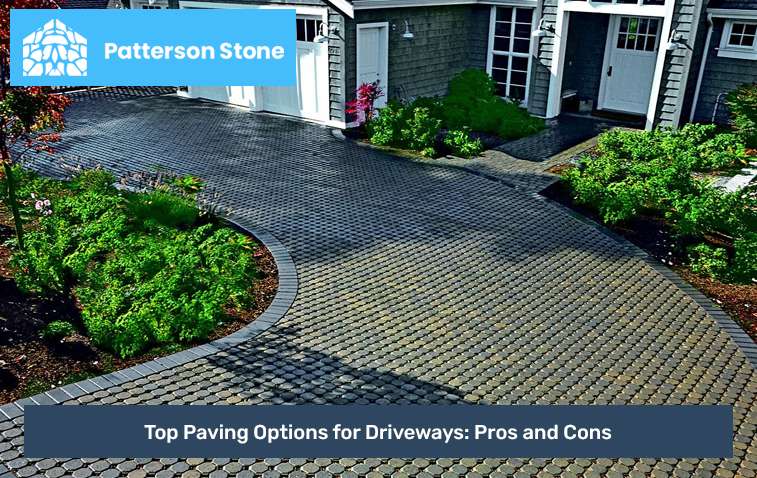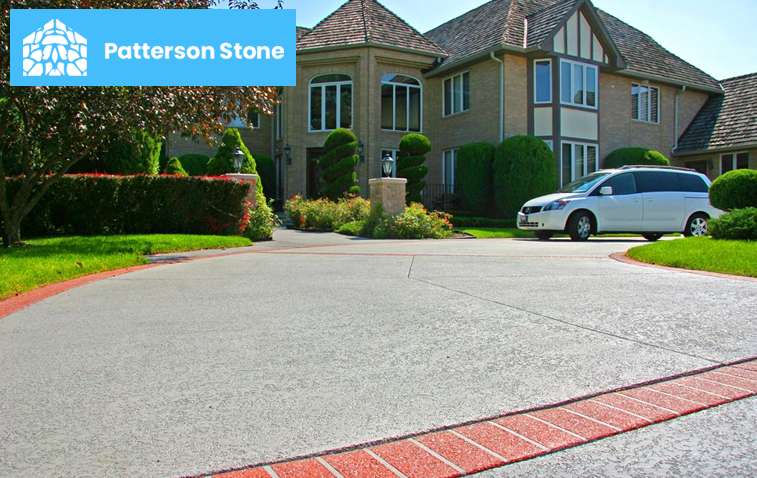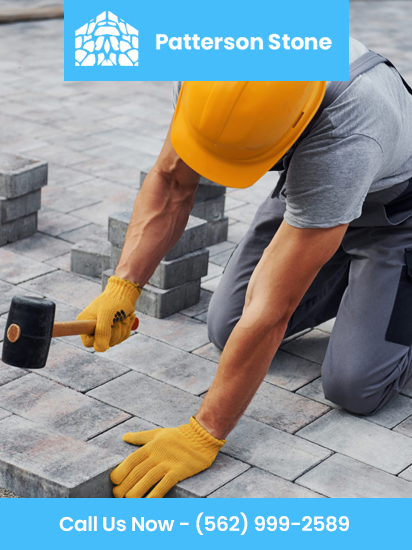Top Paving Options for Driveways: Pros and Cons
Choosing the best paving materials for your driveways is important. The driveway is often the first thing people see when they visit your home. It’s also a space that needs to be durable enough to handle vehicles and withstand different weather conditions. There are several popular paving options available, each with its own set of advantages and disadvantages.
Whether you’re looking for something that’s easy to maintain, environmentally friendly, or simply adds curb appeal, understanding the pros and cons of each material can help you make an informed decision. Let’s explore the top paving options for driveways and see what makes each one unique.

Asphalt Driveways
Asphalt ranks among the most common materials for driveways. Homeowners often choose it for its smooth surface and durability.
Pros of Asphalt Driveways
- Durability: Asphalt driveways are strong and can handle heavy vehicles without getting damaged easily. They are also flexible, which means they can withstand changes in temperature without cracking.
- Quick Installation: Asphalt can be installed quickly, often within a day or two. This is great if you need your driveway ready fast.
- Smooth Surface: The smooth surface of asphalt makes it easy to walk on and drive over. It also provides good traction, which can be important in icy or wet conditions.
Cons of Asphalt Driveways
- Maintenance: Asphalt driveways require regular maintenance, such as sealing, to keep them in good condition. Without proper care, they can develop cracks and potholes over time.
- Heat Absorption: Asphalt absorbs heat, which can make it very hot during the summer. This might not be comfortable if you plan to use the driveway for activities other than parking.
- Limited Color Options: Asphalt is typically available in black or dark gray. If you’re looking for a more colorful or decorative driveway, asphalt might not be the best choice.
Simple Tips:
- Seal Regularly: To keep your asphalt driveway in good shape, plan to reseal it every few years. This will help prevent cracks and extend its lifespan.
- Watch for Cracks: Check your driveway regularly for any small cracks and repair them right away. This can prevent them from getting bigger and more difficult to fix.
- Cool It Down: If your driveway gets too hot, consider using a light-colored coating to reflect some of the heat and keep the surface cooler.
Concrete Driveways
Concrete is another popular choice for driveways. It offers a clean, modern look and is known for its strength and longevity.
Pros of Concrete Driveways
- Longevity: Concrete driveways can last for decades with proper care. They are resistant to weather, heavy loads, and general wear and tear.
- Low Maintenance: Concrete driveways require very little maintenance compared to other materials. They don’t need to be sealed as often as asphalt and are less likely to develop potholes.
- Customizable: Concrete can be poured in a variety of shapes and sizes. It can also be stamped, colored, or textured to create a custom look that matches your home’s style.
Cons of Concrete Driveways
- Cracking: While concrete is durable, it can crack over time, especially in areas with extreme temperature changes. These cracks can be difficult to repair and may require professional help.
- Longer Installation Time: Concrete takes longer to install and cure compared to asphalt. It can take up to a week before the driveway is ready to use.
- Cost: Concrete is generally more expensive than asphalt. This higher initial cost might be a consideration for some homeowners.
Simple Tips:
- Prevent Cracks: To minimize cracking, make sure your concrete driveway is installed with proper joints and is allowed to cure slowly.
- Keep It Clean: Regularly clean your concrete driveway to prevent stains from oil, dirt, or other substances. A power washer can be a useful tool for this.
- Decorative Options: If you want a unique look, consider adding color, stamping, or other decorative finishes to your concrete driveway. This can make it stand out and add curb appeal to your home.
Paver Driveways
Pavers are individual stones, bricks, or tiles that are placed together to form a driveway. They offer a lot of flexibility in terms of design and are a great option for creating a custom look.
Pros of Paver Driveways
- Versatile Design: Pavers come in many shapes, sizes, and colors, allowing you to create a completely custom design. You can mix and match pavers to create patterns, borders, or even artwork on your driveway.
- Durability: Pavers are strong and durable. If one paver gets damaged, it can be easily replaced without affecting the rest of the driveway.
- Permeability: Some types of pavers are permeable, meaning they allow water to pass through them. This can help reduce water runoff and prevent flooding.
Cons of Paver Driveways
- Cost: Paver driveways can be more expensive than other options due to the cost of materials and the labor-intensive installation process.
- Maintenance: Weeds can grow between the pavers, and the joints may need to be refilled with sand over time. Keeping a paver driveway in good shape requires regular upkeep.
- Shifting: Over time, pavers can shift or settle, especially if the ground underneath them is not properly prepared. This can create uneven surfaces or gaps between the pavers.
Simple Tips:
- Use a Weed Barrier: When installing a paver driveway, consider using a weed barrier to prevent weeds from growing between the pavers. This can save you time and effort in the long run.
- Choose Permeable Pavers: If you’re concerned about water runoff, opt for permeable pavers. These pavers allow water to drain through the driveway, reducing the risk of flooding.
- Repair Quickly: If you notice any pavers shifting or becoming uneven, address the issue right away. Re-leveling the affected area can prevent further damage and keep the driveway looking great.
Gravel Driveways
Gravel driveways are a simple and affordable option. They are made up of loose stones that create a permeable surface, allowing water to drain through easily.
Pros of Gravel Driveways
- Affordability: Gravel is one of the most cost-effective materials for driveways. It’s a great choice if you’re looking for an inexpensive option that still looks good.
- Easy Installation: Gravel driveways are relatively easy to install and can be done quickly. This makes them a good option if you need a driveway in a hurry.
- Permeability: Gravel driveways allow water to drain through them, reducing the risk of flooding and helping to prevent erosion.
Cons of Gravel Driveways
- Maintenance: Gravel driveways require regular maintenance. The gravel can shift or spread over time, so you’ll need to rake it back into place and add more gravel as needed.
- Snow Removal: Removing snow from a gravel driveway can be tricky. Shoveling or plowing can disturb the gravel, making it difficult to clear the driveway completely.
- Dust and Dirt: Gravel driveways can be dusty, especially in dry weather. The gravel can also get tracked into your home or garage, which may require more frequent cleaning.
Simple Tips:
- Add Edging: To keep the gravel in place, consider adding an edging material like bricks or stones along the sides of the driveway. This can help contain the gravel and prevent it from spreading.
- Rake Regularly: Regularly raking the gravel will help keep the surface even and prevent any low spots from forming.
- Choose the Right Gravel: Opt for a gravel type that packs well, such as crushed stone or crushed granite. This will help create a more stable surface that’s easier to walk and drive on.
Brick Driveways
Brick driveways are known for their classic and timeless look. They can add a touch of elegance to any home and are a durable option for driveways.
Pros of Brick Driveways
- Aesthetic Appeal: Brick driveways have a beautiful, traditional look that can enhance the curb appeal of your home. The rich color of the bricks adds warmth and character to the driveway.
- Durability: Bricks are strong and long-lasting. They can withstand heavy loads and resist cracking, making them a durable choice for driveways.
- Eco-Friendly: Bricks are made from natural materials, and old bricks can be recycled or reused. This makes them an environmentally friendly option for paving.
Cons of Brick Driveways
- Cost: Brick driveways tend to be more expensive than other materials. The cost of bricks and the labor required to lay them can add up.
- Weed Growth: Like pavers, brick driveways can develop weeds between the joints. Keeping the joints filled with sand or mortar can help prevent weed growth.
- Maintenance: While bricks are durable, they can become uneven over time due to settling or shifting of the ground beneath them. This may require occasional maintenance to keep the driveway level.
Simple Tips:
- Seal the Bricks: To protect your brick driveway from stains and weathering, consider sealing the bricks. This will help maintain their appearance and extend their lifespan.
- Fill the Joints: Regularly check the joints between the bricks and fill them with sand or mortar as needed. This will help prevent weeds and keep the driveway looking neat.
- Choose Quality Bricks: When selecting bricks for your driveway, choose high-quality, weather-resistant bricks that are designed for outdoor use. This will ensure that your driveway lasts for many years.
Choosing the right paving option for your driveway depends on several factors, including the look you want to achieve, the level of maintenance you’re willing to commit to, and the durability you need. Whether you opt for the smooth surface of asphalt, the long-lasting appeal of concrete, the versatile design of pavers, the simplicity of gravel, or the classic charm of brick, each material has its own unique benefits and drawbacks. By understanding the pros and cons of each paving option, you can make a decision that best suits your needs and enhances the beauty and functionality of your driveways.
FAQs
To prevent weeds, consider using a weed barrier during installation and regularly fill the joints with sand or mortar. Keeping the surface clean and free from dirt and debris can also help reduce weed growth.
Yes, gravel driveways can be installed on a slope, but it’s important to use the right type of gravel that packs well and to install proper edging to keep the gravel in place. Regular maintenance will be needed to prevent gravel from shifting downhill.
It’s generally recommended to seal an asphalt driveway every 2 to 3 years to protect it from the elements and prevent cracks from forming. Regular sealing helps extend the lifespan of the driveway.
The best way to clean a concrete driveway is to use a power washer or a hose with a strong nozzle to remove dirt and stains. For tougher stains, you can use a mild detergent or a concrete cleaner and scrub with a stiff brush before rinsing thoroughly.

